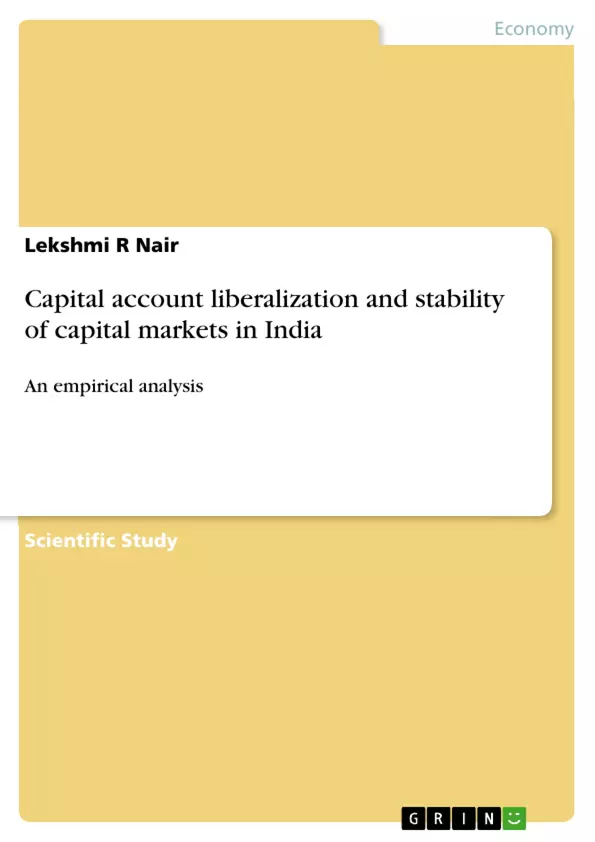This paper examines the implications of capital account liberalization on the stability of capital markets in India captured in terms of two indicators, the market liquidity indicator and market volatility from 1993-94 to 2007-08. The empirical analysis, after controlling for other variables affecting the stability of capital markets, shows that capital account liberalization; particularly foreign portfolio investment liberalization has not contributed significantly to market liquidity whereas it has contributed significantly to increased market volatility. These results are particularly relevant since India opened its financial markets to Foreign Portfolio flows at an earlier stage of its reform process much before the development of domestic financial markets unlike the sequencing pattern flowed by most countries that were undergoing similar process of liberalization. Further, these results have important policy implications since the choice of an attitude towards full capital account convertibility in India has become a debateful issue.
Inhaltsverzeichnis (Table of Contents)
- Introduction
- Research Problem and Relevance
- Preliminary Trends
- Estimation Procedure and Results
- Conclusion and Policy Implications
Zielsetzung und Themenschwerpunkte (Objectives and Key Themes)
This paper investigates the impact of capital account liberalization, specifically foreign portfolio investment liberalization, on the stability of Indian capital markets. It uses two indicators, market liquidity and volatility, to assess market stability during the period from 1993-94 to 2007-08. The study analyzes the influence of capital account liberalization while controlling for other variables impacting market stability. The analysis aims to provide insights into the consequences of capital account liberalization on market liquidity and volatility in India.
- Impact of capital account liberalization on market stability in India
- Influence of foreign portfolio investment liberalization on market liquidity and volatility
- Comparison of India's financial liberalization sequencing with other countries
- Policy implications of capital account convertibility in India
- Analysis of net capital flows and stock market indicators following liberalization
Zusammenfassung der Kapitel (Chapter Summaries)
- Introduction: This chapter provides background information on capital account liberalization in developing countries and discusses the theoretical implications of liberalization on market stability. It highlights the mixed evidence from empirical studies and country experiences.
- Research Problem and Relevance: This chapter focuses on the evolution of India's capital account policy from an inward-looking approach to a more convertible regime. It describes the liberalization process, including the opening of financial markets to foreign portfolio capital and the sequencing pattern followed by India. The chapter emphasizes the objectives of FPI opening in India and the lack of comprehensive studies on the implications of capital account liberalization on stock market liquidity and volatility.
- Preliminary trends: This chapter analyzes data on foreign portfolio investment (FPI) and foreign direct investment (FDI) flows in India following liberalization. It highlights the dominance of FPI flows over FDI flows and the significant share of net foreign investment inflows in total flows.
Schlüsselwörter (Keywords)
The primary focus of this paper is on capital account liberalization, portfolio flows, financial stability, liquidity, volatility, and financial sector reforms. The analysis examines the impact of foreign portfolio investment on the Indian stock market, offering insights into the relationship between liberalization and market stability. The study contributes to the understanding of financial liberalization processes in emerging economies, particularly in the context of India.
Frequently Asked Questions
What is the focus of this study on the Indian capital market?
The study examines how capital account liberalization, particularly foreign portfolio investment (FPI), has impacted market liquidity and volatility in India between 1993 and 2008.
How did FPI liberalization affect market volatility in India?
According to the empirical analysis, capital account liberalization has contributed significantly to increased market volatility in the Indian stock market.
Did liberalization improve market liquidity?
The results show that foreign portfolio investment liberalization has not contributed significantly to market liquidity in the analyzed period.
How did India's liberalization sequence differ from other countries?
India opened its financial markets to foreign portfolio flows at an early stage of its reform process, even before fully developing its domestic financial markets, which is a unique sequencing pattern.
What are the policy implications of this research?
The findings are relevant for the ongoing debate on full capital account convertibility in India, suggesting caution regarding the impact of FPI on market stability.
- Arbeit zitieren
- Faculty Associate Lekshmi R Nair (Autor:in), 2011, Capital account liberalization and stability of capital markets in India, München, GRIN Verlag, https://www.grin.com/document/179832



